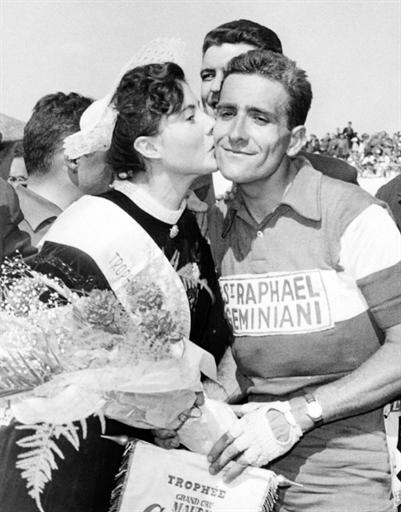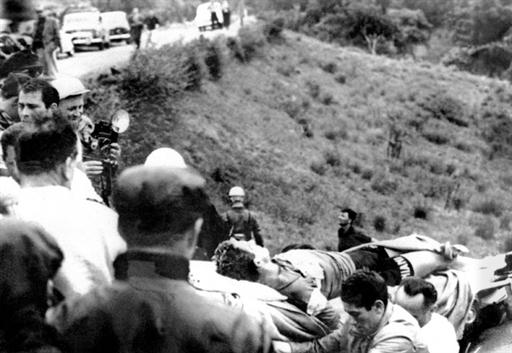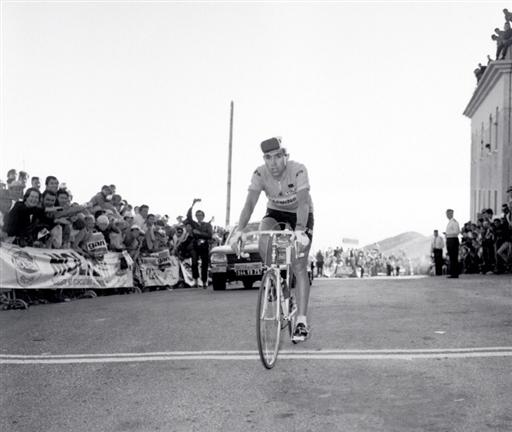The Tour through the decades
Part 1: Rivière and Merckx, 1960 and '70



There are defining moments in the Tour de France that affect more than just that year's race but the legend of the event itself. Triumphs and tragedies alike make up the DNA of La Grande Boucle.
In this two-part feature we look at single days from Tours de France a decade apart, starting with the 1960 and 1970 editions, to illustrate how a stage of this race can define the outcome of the event and shape the legend of the Tour.
We go back 50 years to the story of Roger Rivière in the 1960 Tour and Eddy Merckx's ride on Mont Ventoux 10 years later. They are tales of tragedy and triumph, although the latter could have been worse for the legendary Belgian save for medical assistance atop Ventoux's famed slopes.
Both define what it means to ride the world's biggest bike race and the sacrifices some men take to win it.
1960: Rivière's Tour and career ends in a ravine

Heading into the 1960 Tour de France, Roger Rivière looked set to become France's latest Tour champion in the absence of Jacques Anquetil, who had ridden that year's Giro d'Italia just months earlier.
The 1960 edition was ridden with the old national team system, as the likes of Federico Bahamontes, Willy Altig and Tom Simpson lined up for their countries, with four squads representing four regions of France included on the start list.
The latest race content, interviews, features, reviews and expert buying guides, direct to your inbox!
A talented rider against the clock, Rivière won the pursuit world championship and took the hour world record, 10km world record and 20km world record in 1957, '58 and '59. He had beaten Anquetil and Ercole Baldini in the time trials of the 1959 Tour de France at just 23 years of age and was expected to shine in this discipline during the 1960 edition.
Poised to secure the general classification after winning the opening half-stage plus stages six and 10, Rivière and his team looked strong going into the second half of the Tour, with team member Henri Anglade briefly holding the race lead in stages four and five but losing it to Belgium's Jan Adriaensens.
At the start of the 14th stage in Millau and with Italy's Gastone Nencini in the oevrall lead, Rivière had confidently stated: "I am sure I can win this Tour, even before the time trial stage to Avignon." He hadn't counted on the massive misfortune which was to strike him in his peak however, and after 55km of the stage his life changed forever.
Heading down the Col de Perjuret in pursuit of maillot jaune Nencini, Rivière fell down a ravine, having missed a corner. He suffered a double fracture of the spinal column and was paralysed in both legs, an injury which forced him off the bike for the rest of his life.
Black and white news footage from the accident shows Tour director Jacques Goddet assisting medical crews as they attend to the stricken rider, the concern for Rivière's welfare clearly drawn across his face.
Meanwhile, back on the road Martin Van Geneugden took his opportunity and won the stage while Nencini held onto the race lead. The Italian was the eventual winner whilst Rivière began a long rehabilitation process, although ultimately the Frenchman's story was to end tragically when he died 16 years after his accident at the age of 40.
The Tour is often touched by tragedy and occasionally death, although the story of Roger Rivière cuts deeply for many riders. His life was never in danger during the crash but it effectively cut his life short because at just 24 and seemingly with the world at his feet he was denied the very thing that defined him.
1970: Merckx on the Ventoux

There are stories of death on Mont Ventoux, the most notable being Tommy Simpson's untimely end on its slopes in 1967. But three years after that momentous occasion, the legendary Eddy Merckx was reminded of who calls the shots by the 'Giant of Provence'.
At his devastating best in the 1970 Tour, Merckx had won the prologue in Limoges, the half-stage from Valenciennes-Forest to Vorst, the 10th stage from Belfort to Divonne-les-Bains and the following day's individual time trial in Divonne-les-Bains plus the mountainous 12th stage from Thonon-les-Bains to Grenoble.
Just two days later it was time to tackle the famous Mont Ventoux, where tragedy had hit several years earlier but the climb of which race organisers had deemed fit for use by the Tour's peloton again after Simpson's death.
Greeted by a typical searingly hot summer's day in Provence, the riders took off from Grenoble with their final destination the weather station atop the lunar-like slopes of Ventoux, 194.5km later. Quickly consider that the penultimate stage of last year's Tour from Montélimar to Mont Ventoux was 167km, and it was a long day in the saddle for Merckx and co.
The Belgian, riding for in yellow, had opened a gap on the chasing Portuguese rider Joaquim Agostinho eight kilometres from the summit. Head bobbing in a clear sign that the Belgian was suffering from the back pain that plagued him after a serious crash the previous year, Merckx pushed through that barrier to win the stage and stamp his authority on the race.
He finished 1:11 ahead of fellow Belgians Martin Van Den Bossche and Lucien Van Impe and was able to tell several journalists "No, it's impossible!" that he had won there before he collapsed and was given oxygen before being taken to hospital.
There he was visited by Van Den Bossche and regained consciousness; the attending doctor declared that Merckx's system had temporarily failed due to a lack of oxygen, a lucky escape for the man who would go on to beat Joop Zoetemelk by 12:41 at race's end in Paris en route to a total of five Tour de France victories.
It was a triumph that could easily have become a tragedy, had medical staff not been able to revive Merckx. The incident ultimately added to the lustre of the legend of 'The Cannibal' plus those of Mont Ventoux and the Tour de France.